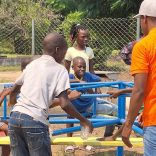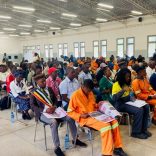Mozambique: Over three million children to be vaccinated against polio in Nampula
Angola / Mozambique: Serious rights violations in 2024 – Amnesty International

Image: Amnesty International
The non-governmental organisation (NGO) Amnesty International on Tuesday pointed to serious human rights violations in Angola and Mozambique in 2024, highlighting violent repression of protests, arbitrary arrests and abuses related to social and political crises.
In its annual report on ‘The State of Human Rights in the World’ released today, the organisation denounced the brutal repression by security forces against peaceful demonstrations in Angola.
“The Angolan National Police (PNA) has cracked down on at least seven protests against the continued detention of activists (…), the high cost of living, the denial of workers‘ rights and the possibility that President João Lourenço will serve a third term in office,” the document reads.
Amnesty International also reported that enforced disappearances remain common practice in the country, as do intimidation and arbitrary arrest of journalists and human rights defenders, contributing to an environment of fear and self-censorship in the country’s media.
The NGO also stressed that Angola has been affected by the worst drought caused by the El Niño climate phenomenon in more than a century, particularly affecting the southern provinces of Cunene, Huíla and Namibe.
The climate crisis has compromised agricultural production and exposed around 5% of the population, mainly women and children, to food insecurity, a situation aggravated by the government’s planned cuts in fuel subsidies.
In Mozambique, following the October 2024 elections, “security forces unleashed the worst crackdown in recent years against protests, resulting in the deaths of at least 277 people, including children and innocent victims”.
The province of Cabo Delgado, where there is armed conflict between insurgent groups and government forces, continued to be a hotspot for human rights violations, with at least 20 civilian deaths caused by armed groups and pro-government militias.
“Journalists were victims of intimidation, harassment, threats and attacks,” in an attack on the right to freedom of expression and peaceful assembly, Amnesty International added.
On the other hand, “the police did not protect people from kidnapping by criminals,” further undermining public safety.
In Brazil, the organisation pointed out that actions by the security forces continued to disproportionately affect people of African descent.
According to the Ministry of Human Rights, there was an “80% increase in human rights violations against Afro-Brazilian religious communities” and 342 violations were documented by the Ministry of Racial Equality in the first half of 2024 alone.
Amnesty International also criticised the weakness of the Programme for the Protection of Human Rights Defenders, which is present in less than half of Brazilian states, leaving activists, indigenous leaders and quilombolas exposed to threats and murder.
Equatorial Guinea, which is also part of the Community of Portuguese Language Countries (CPLP), is one of the ‘many countries’ on the African continent where Amnesty claims that “arbitrary arrests and detentions of opposition activists and human rights defenders have been reported”.
In the country, residents of Annobón (the only island of the country located in the Southern Hemisphere of the Atlantic Ocean) were persecuted for protesting against damage to their homes, agricultural land and the island’s ecosystem, allegedly due to constant dynamite explosions linked to mining operations.
Following the protests, “more than 30 people from Annobón were arrested and detained,” and mobile phone and Internet services were shut down for several weeks.
The report ‘The State of the World’s Human Rights’ is an annual report by Amnesty International highlighting human rights issues throughout the year at regional and global levels.













Leave a Reply
Be the First to Comment!
You must be logged in to post a comment.
You must be logged in to post a comment.